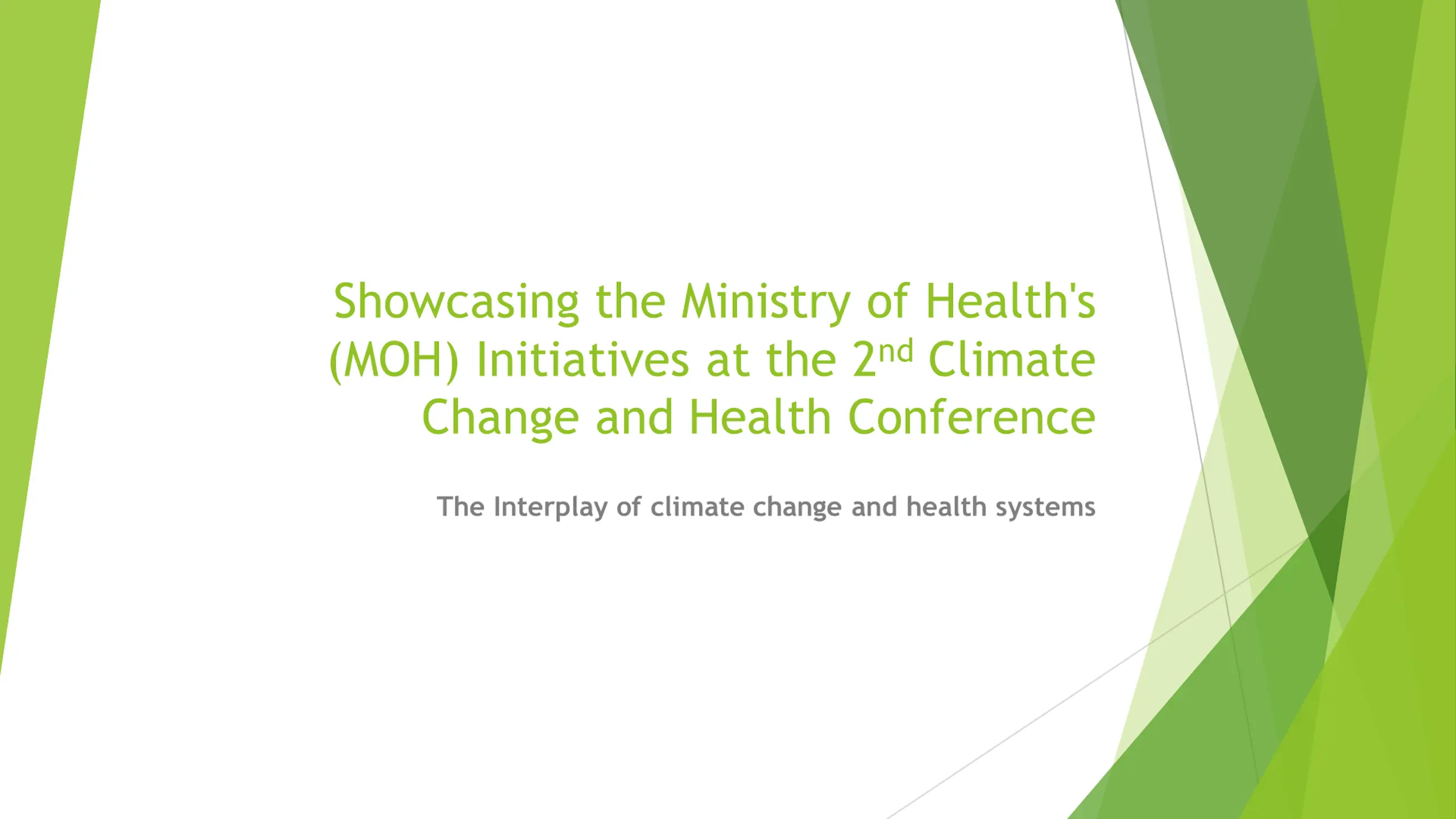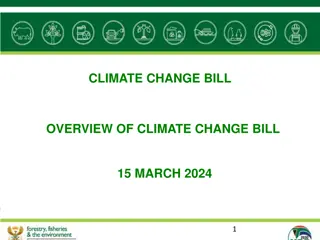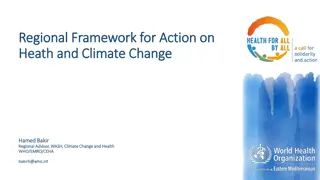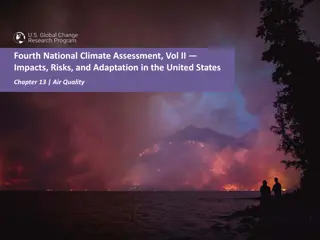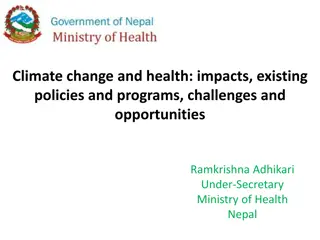Improving Health Amid Climate Change Challenges
Climate change has significant impact on health, requiring global sectors to act. Explore initiatives of the Ministry of Health in addressing climate-related health threats. Understand the interplay between climate change and health systems for a sustainable future. Learn the adverse effects of climate change on health in Kenya and the urgent need for adaptation financing.
Download Presentation

Please find below an Image/Link to download the presentation.
The content on the website is provided AS IS for your information and personal use only. It may not be sold, licensed, or shared on other websites without obtaining consent from the author.If you encounter any issues during the download, it is possible that the publisher has removed the file from their server.
You are allowed to download the files provided on this website for personal or commercial use, subject to the condition that they are used lawfully. All files are the property of their respective owners.
The content on the website is provided AS IS for your information and personal use only. It may not be sold, licensed, or shared on other websites without obtaining consent from the author.
E N D
Presentation Transcript
Showcasing the Ministry of Health's (MOH) Initiatives at the 2ndClimate Change and Health Conference The Interplay of climate change and health systems
Climate change Climate change refers to long time shift in world temperatures and weather patterns, can also be described as significant variation of average weather conditions (WHO,2023) Burning fossil fuels, cutting down forests and farming livestock are increasingly influencing the climate and the earth s temperature. It is becoming progressively clear that the climate emergency is also a health emergency, and that while every sector has a role to play in protecting our planet s natural systems the imperative for the health sector is especially strong. The health sector, at international, national and subnational levels has a duty to protect the public from climate-related threats to health and to mitigate against the effects of climate change. (WHO, 2008).
Climate change and health Climate change affects the social and environmental determinants of health clean air, safe drinking water, sufficient food and secure shelter. Between 2030 and 2050, climate change is expected to cause approximately 250 000 additional deaths per year, from malaria, cholera malnutrition and heat stress. The direct damage costs to health (i.e. excluding costs in health-determining sectors such as agriculture and water and sanitation), is estimated to be between USD 2-4 billion/year by 2030. Reducing emissions of greenhouse gases through better transport, food and energy-use choices can result in improved health, particularly through reduced air pollution.
Climate change and Health impact in Kenya In Kenya today some of the most adverse impacts of climate change to human health include; The geographic expansion of vector borne diseases, Malnutrition, and food insecurity due to drought, Increase in waterborne diseases, Increased land- surface temperature, Water scarcity affecting agriculture. (IFRC, 2021). In Kenya, 6.7 Million clinical malaria cases are reported annually, with 70% of her population exposed, and mortality is 4000 per annum( Zahul E et al 2023). 4.4 million Kenyans in ASAL regions are facing acute food insecurity (UNICEF, 2023). There is a 59 % increase in the number of confirmed choleras from 4821cases reported in February 2023 to 11694 cases reported in June 2023. The case fatality for cholera is 1.6 % which is above the WHO threshold of 1%. About 22, 569 households were displaced by flooding.
Adaptation financing in health sector Climate Centre research indicating that adaptation finance for health remains very low. It is estimated that the effects of climate change in health and wellbeing will cost $2-4billions per year by 2030, and if current trend continues all gains in public health will be reversed (T Alcayna, D O'Donnell ,2022). The Climate Centre scoping review found that out of a total of 50 multilateral projects that were related to health, only ten representing US$ 45.9 million or 0.5 per cent of multilateral adaptation finance focused specifically on the health sector.
The Kenyan government is bound to the constitution (Article 43(1) (a)) which guarantees that every person has the right to the highest attainable standard of health. It is also a signatory to the Paris agreement and submitted its revised Nationally Determined contributions (NDCs) on the 24th of December 2020 which highlighted climate change adaptation actions in the health sector. In furtherance of its commitment to protecting the health of Kenyans and ensuring environmental sustainability, Kenya joined the world at the 26th Conference of Parties (CoP) in which it committed itself to Developing a Healthcare system, which is resilient to the impacts of climate change Developing a health system that is sustainable with low carbon emissions.
Climate change and health initiatives In fulfillment these commitments, the MOH has embraced diverse climate change and health initiatives, including: Migration to Non-burn Technologies for Healthcare Waste Treatment: The MOH is transitioning to non-burn technology for clinical waste management in 25 high-volume healthcare facilities, with potential expansion to 47 counties. This shift addresses greenhouse gas emissions and persistent organic pollutants, aligning with COP 26 commitments Scoping Literature Review: In collaboration with AFIDEP and LSHTM, the MOH is spearheading a scoping review of climate change's health impacts in Kenya. This research identifies links between climate change, environmental exposures, and health outcomes, pinpointing knowledge gaps and research opportunities. On Non- Burn technology , medical microwave , shreds and microwaves the HCW and volume reduction is 80% Resultant waste is harmless and can be further processed into paving slabs
The Ministry of Health (MOH) collaborated with the Aga Khan University to train 46 healthcare professionals across 16 counties. The training focused on effectively utilizing the AKDN tool, a specialized resource designed to quantify greenhouse gas emissions within healthcare facilities. This tool's precise computation and monitoring of carbon footprints associated with healthcare operations enable the formulation and diligent tracking of actionable measures aimed at substantial carbon emission reduction. Development of the Kenya Climate Change and Health Strategy (KCCHS): This strategic framework steers short-term and long-term actions, prioritizing climate change and health considerations. The KCCHS provides a platform to establish fundamental priorities, articulate visionary aspirations, and chart a coherent trajectory, addressing the profound implications of climate change for public health. Reviewing of policies and guidelines on Health care waste management ongoing Mainstreaming of Climate change & Health on programs and projects including legal frame works Development of M& E framework on HCW management Develop an PPP framework on the NON burn technology for sustainability THANK YOU
